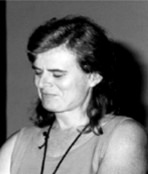by Lee Katterman

Karen K. Uhlenbeck studied mathematics for many years, well into graduate school, before she finally acknowledged that a career in this field was right for her. “Even when I had my Ph.D. for five years,” she said, “I was still struggling with whether I should become a mathematician. I never saw myself very clearly.”
Today, Uhlenbeck, holder of the Sid W. Richardson Foundation Regents Chair in Mathematics at the University of Texas at Austin, is widely acclaimed as a talented and creative mathematician as well as someone who takes very seriously her obligation to mentor young women mathematicians. Through her research, Uhlenbeck has made significant contributions to our understanding of the fundamental properties of matter. In her professional life, she has demonstrated a perseverance that enabled her to succeed in science in spite of the discouraging roadblocks she encountered.
Uhlenbeck was born in 1942 in Cleveland, Ohio, and spent her teen years in rural New Jersey. Her active participation in sports and physical activity was unconventional for the times — girls were expected to be interested in dating, marriage, and having and raising children.
Her life path, Uhlenbeck says, was influenced by strong and independent women in her family. Her grandmother, for one, raised 12 children almost single-handedly and lived to be 103 years old. Her mother — Carolyn Keskulla — had a fiercely independent streak as an artist, intellectual and nonconformist. Out of this, Karen Uhlenbeck decided early on that she probably would become “a forest ranger or some kind of scientist,” although she never imagined during high school that mathematics was in her future.
Uhlenbeck came to the University of Michigan in 1960 as an Honors Program student. It was during these years that Uhlenbeck discovered her passion for mathematics. In fact, she switched her major from physics to mathematics because she was doing poorly in physics lab courses and flourished under a creative freedom she felt in her honors mathematics courses. But even then, Uhlenbeck didn’t yet see herself pursuing a career in mathematics.
She did decide to attend graduate school — but mainly because her boyfriend and other friends were doing so. Her boyfriend was going to Harvard, yet Karen, whose graduate studies were supported by fellowships from the National Science Foundation and Woodrow Wilson Foundation, did not give serious thought to the school. Initially, she attended the Courant Institute in New York City, which had an excellent mathematics program, but was considered less prestigious because of its “applied math” focus.
After getting married in 1965, Uhlenbeck transferred to Brandeis to be closer to her husband. “For someone like me, Brandeis was a super place to be a graduate student because the faculty were all extremely young,” Uhlenbeck recalls. She now realizes that the young faculty provided role models she wouldn’t have found at top traditional mathematics schools.
After receiving her Ph.D. in 1968, she followed her bio-physicist husband to Massachusetts Institute of Technology and then Berkeley, where she worked as a non-tenure track lecturer because the schools interested in her husband were not interested in her. In 1971, Uhlenbeck was offered an assistant professorship at the University of Illinois, Urbana-Champaign. This time her husband moved with her. However, the marriage ended a few years later, at which time Uhlenbeck joined the faculty at the University of Illinois–Chicago.
A few colleagues at Urbana-Champaign and Chicago provided more role models (including her first woman faculty colleague) that helped Uhlenbeck put her career into a higher gear. In 1982, she received a MacArthur Fellowship, the so-called “genius” award. She further developed her research as a visiting professor at Berkeley, Harvard, the Max Planck Institute and University of California–San Diego. In 1986, at age 44, Uhlenbeck became the first woman mathematician elected to the National Academy of Sciences. Since then, only two other women mathematicians have been elected to the Academy — both in the last two years — out of a total of 111 mathematicians who are current members.
In announcing her election to the National Academy of Sciences, the Academy said: “Uhlenbeck has been the foremost pioneer in developing and applying hard analytic methods in the calculus of variations and nonlinear partial differential equations to the study of the mathematical structure of the gauge field theories of present-day fundamental physics.”
In 1995, Uhlenbeck received the Common Wealth Award for Science and Technology from Sigma Xi, the national research honorary society, and, in 1984, was named Alumna of the Year by the U-M.
Although Uhlenbeck says she entered mathematics believing she could simply work by herself and hide from the pressures women faced in academia, Uhlenbeck ultimately forged a number of collaborations that helped her work. She also learned that she truly enjoyed mentoring students. She is especially proud of her role as one of the founders of the Park City Mathematics Institute at the Institute for Advanced Study at Princeton. Under the auspices of this Institute, Uhlenbeck has organized a mentoring program for women mathematicians. Over a two-week period, the women participate in seminars, working problem groups, and mentoring and networking sessions. They also have an opportunity to meet and converse with mathematicians in residence at the Institute for Advanced Study.
Karen Uhlenbeck has blended her unique interests, a curiosity for mathematics and inquiry, and a doggedness to surpass the social hurdles she has encountered to create a successful career as a mentor and scientist.